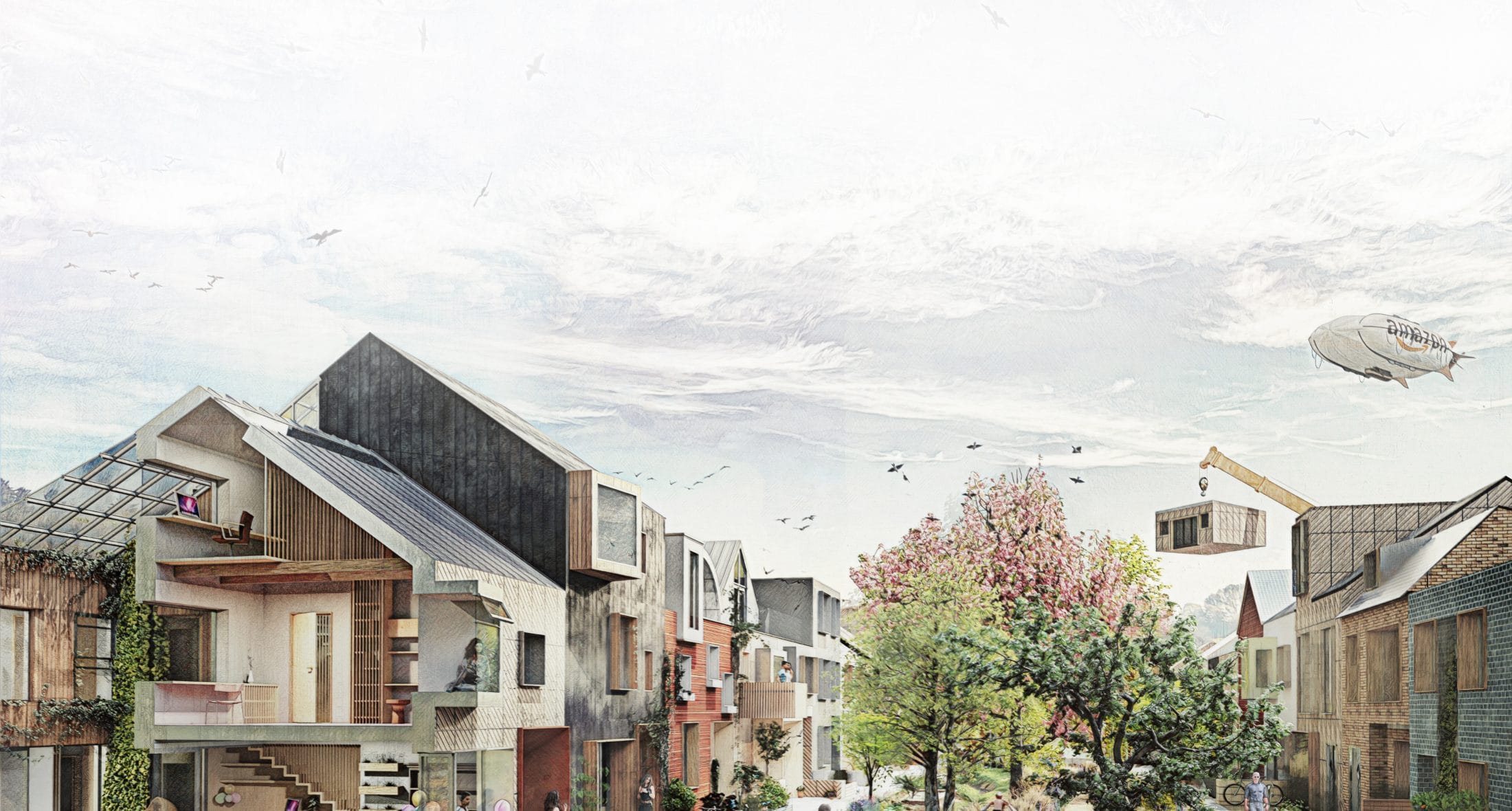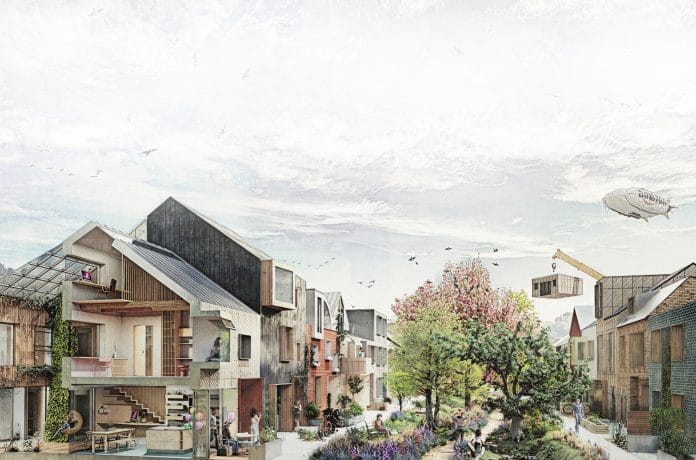
We are pleased to announce that the University of Sheffield Advanced Manufacturing Research Centre (AMRC) will support HLM Architects as we develop our sustainable ‘Forever Home’ concept, one of six finalists in the prestigious Home of 2030 Design competition.

Our concept, which will see robotics, vision inspection and augmented reality technologies harnessed to the latest innovations in construction, is to be introduced to the Homes England Development Framework this year to explore the possibility of developing bids for a series of homes on land owned by Homes England.
It follows the conclusion of the landmark Home of 2030 contest last year to find homes that are age friendly and have low environmental impact, support healthy living and can be delivered at a large scale to solve our housing shortage.
Our ‘Forever Home’ exploits a universal manufacturing platform to enable flexible, affordable and sustainable ‘forever’ homes that are delivered using a circular economy approach. These homes are able to grow and shrink to suit their owners’ needs over their lifetime, meaning people can invest in their homes rather than in the cost of having to move, allowing them to put down strong roots that support stable communities.
We developed this with support from the University of Sheffield AMRC on design for manufacture and assembly and design for disassembly and adaptability approaches. The ambition is to solve the capacity and compatibility issues of offsite approaches to housing construction by developing a design standard that enables any MMC system to deliver the same high quality, sustainable design with parts that are interchangeable.
Philip Watson, Director and Head of Design of HLM Architects, said: “Our ambition is to use the power of design and technology to create homes that are flexible, sustainable and affordable. Moreover, we want to create a design standard platform that enables the entire construction and manufacturing industry to unite to solve our housing crisis. We are excited now to be taking this to the next stage with our partners at the AMRC, helping the concept come closer to fruition.”
James Illingworth, Head of Construction at the AMRC, added that supporting the ‘Forever Home’ design concept had been “an exciting opportunity”.
He said: “The ‘Forever Home’ concept is an agnostic MMC approach, which should enable greater uptake and resilience for both manufacturer and client through putting the customer first to produce an adaptable, sustainable and affordable home. Our role was to explore what the manufacturing process might look like for each stage of the home’s lifecycle and I was involved with the brainstorming for the construction methodology.
“The opportunity to develop a concept design standard from the ground up considering the manufacturing approach is fantastic and ensures assembly challenges can be avoided in the future.”
The AMRC has been “able to consider future manufacturing methods that incorporate advanced technologies such as robotics, machine vision inspection and augmented reality to ensure a quality-first productive approach”, he added.
“The flexibility of the concept enables offsite manufacturing and distributed construction to be exploited through the home’s life cycle, enabling a home for life that can expand and contract according to the owner’s needs. Much of the technology required to achieve this can be adapted and applied from other industry sectors such as automotive and aerospace.”
The biggest challenge facing housing both presently and beyond 2030 is a lack of capacity to build to meet the demand of a growing population, with the current shortfall estimated to be at least 100,000 homes per year.
Watson says this situation is “further exacerbated” by an accelerating skills shortage due to an ageing workforce and low entry of young people into the manual labour side of the construction industry. In tandem, the overarching climate emergency demands that we build with less waste in construction and reduced energy demands in occupation. Furthermore, the economic situation of the past decade has meant that many young people have been unable to afford to leave the parental home.
“A new model of affordable housing is required,” said Watson. “We believe that to address these challenges head-on we need to make better use of MMC and the benefits it brings, including: improving speed of build; reducing cost; reducing material waste; improving finished quality; improving environmental performance in use; and maximising the social value in that it brings by creating skilled and semi-skilled jobs in manufacturing in controlled and safe environments.
“We propose to develop a universal modular platform that provides interchangeability with a deep and varied ecosystem of components and suppliers. This will enable clients to select varied components from multiple companies within the ‘platform ecosystem’, empowering them to build, maintain, reconfigure, upgrade or shrink their ‘Forever Home’.”
The system would facilitate a circular economy by using finite resources in a more sustainable way and by allowing manufacturers to refurbish and resell components, increasing their possible revenue streams.
The finalists were announced by the Housing Minister Christopher Pincher MP, after the competition saw hundreds of small businesses, designers and manufacturers come forward with ideas for new low carbon, age-friendly homes, meeting the highest standards of design.
For phase two of the competition, HLM Architects and the AMRC were joined by Mid Group, a ‘construction disruption’ contractor with advanced BIM capability to help develop a universal modular platform that provides interchangeability with a deep and varied ecosystem of components and suppliers. Their 7D BIM ability was able to provide specification, time, capital cost, whole life cost, and maintenance information for each component.
Completing the team are engineering firm Hydrock and Greenbuild, HLM Architects’ sustainability consultant partners, creating a multi-disciplinary consortium to take the concept forward.
Housing Minister Pincher said: “This competition demonstrates the best of British design being brought to bear on a key issue for today, and future generations: delivering homes that are good for the planet and that promote healthy, independent living for older generations.”
Minister for Clean Growth and Energy, Kwasi Kwarteng MP said: “Cutting homeowners’ heating bills and making buildings greener is the next step in our plans to reach net zero emissions by 2050, and pioneering low-carbon initiatives like these will future proof our housing stock for years to come.”
“The innovation and talent shown by the finalists in designing solutions to meet the needs of our future population has been very exciting and I look forward to seeing what comes next.
Alan Jones, President of the Royal Institute of British Architects, said: “The UK urgently needs a broad mix of affordable, age-friendly and sustainable housing – and these shortlisted proposals provide exactly that. Through the clever configuration of private and public space, natural light and ventilation, intelligent use of materials and technologies – these cost-effective, low carbon homes show what’s possible when architects collaborate.”

